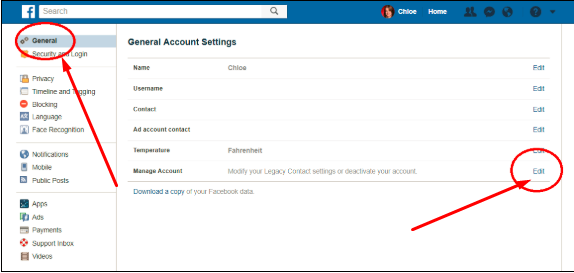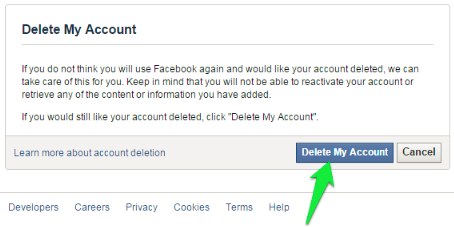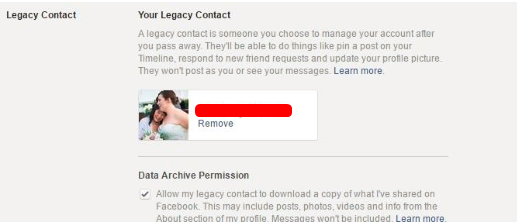How to Cancel Delete Facebook Account 2019
By
MUFY UJASH
—
May 20, 2019
—
Deleting Facebook Account
Current events might have you considering a break from Facebook. That's not a choice for everybody; in that situation, simply tighten up your account settings. How To Cancel Delete Facebook Account: Yet if having your data mined for political objectives without your approval illustrations you out, there are ways to liberate on your own from the substantial social media.
If you're ready for a social networks break, right here's how you can delete Facebook.
How To Cancel Delete Facebook Account
Deactivating
Facebook gives you 2 options: two choices: deactivate or erase
The first could not be much easier. On the desktop, click the drop-down menu at the top-right of your display as well as select settings. Click General on the top left, Edit beside "Manage Account" Scroll down as well as you'll see a "Deactivate My Account" link near the bottom. (Right here's the direct link to utilize while logged in.).
If you get on your mobile phone, such as utilizing Facebook for iphone, in a similar way most likely to settings > Account settings > General > Manage Account > Deactivate.
Facebook doesn't take this lightly - it'll do whatever it could to keep you around, including emotional blackmail concerning just how much your friends will miss you.
Because of this, "Deactivation" is not the like leaving Facebook. Yes, your timeline will certainly go away, you will not have accessibility to the site or your account via mobile applications, friends cannot publish or contact you, as well as you'll shed access to all those third-party solutions that use (or require) Facebook for login. But Facebook does not delete the account. Why? So you can reactivate it later.
Just in case that anticipated re-activation isn't really in your future, you need to download a copy of all your data on Facebook - posts, images, videos, talks, and so on-- from the settings menu (under "General"). Exactly what you locate may amaze you, as our Neil Rubenking learnt.
Account Deletion
To completely remove your Facebook account forever and ever, most likely to the Delete My Account web page at https://www.facebook.com/help/delete_account. Simply be aware that, per the Facebook data use policy "after you eliminate information from your profile or erase your account, copies of that information might stay viewable elsewhere to the level it has been shown to others, it was or else dispersed pursuant to your personal privacy settings, or it was duplicated or stored by various other customers.".
Translation: if you composed a comment on a friend's standing upgrade or picture, it will remain even after you erase your own account. Several of your posts and also photos may hang around for as long as 90 days after removal, too, however simply on Facebook web servers, not reside on the site.
Deletion on Behalf of Others
If you want to inform Facebook concerning a customer you understand is under 13, you can report the account, you narc. If Facebook can "reasonably verify" the account is made use of by a person underage-- Facebook bans children under 13 to abide by federal law-- it will erase the account promptly, without educating any individual.
There's a different type to request removal of represent people who are medically incapacitated and therefore not able to use Facebook. For this to work, the requester has to prove they are the guardian of the individual in question (such as by power of attorney) as well as offer an official note from a medical professional or medical center that define the incapacitation. Edit any information necessary to keep some personal privacy, such as clinical account numbers, addresses, etc.
If an individual has actually passed away, a legacy get in touch with-- a Facebook pal or relative that was marked by the account proprietor prior to they died-- could get accessibility to that person's timeline, as soon as authorized by Facebook. The heritage call could should provide a link to an obituary or various other documents such as a fatality certificate. Facebook will "memorialize" the web page so the departed timeline resides on (under control of the legacy call, who can not publish as you), or if preferred, remove it.
Assign a certain legacy get in touch with individual to handle your account after your passing away. You could find that under settings > General > Manage Account > Your Legacy Contact. As soon as you set one up, you'll obtain a notice annually from Facebook to check that the get in touch with must remain the exact same, unless you pull out of that. You could additionally take the additional step of ensuring that after you pass away, if the legacy call does report you to Facebook as dead, your account gets deleted (even if the tradition get in touch with wants the timeline to be hallowed).
If you're ready for a social networks break, right here's how you can delete Facebook.
How To Cancel Delete Facebook Account
Deactivating
Facebook gives you 2 options: two choices: deactivate or erase
The first could not be much easier. On the desktop, click the drop-down menu at the top-right of your display as well as select settings. Click General on the top left, Edit beside "Manage Account" Scroll down as well as you'll see a "Deactivate My Account" link near the bottom. (Right here's the direct link to utilize while logged in.).
If you get on your mobile phone, such as utilizing Facebook for iphone, in a similar way most likely to settings > Account settings > General > Manage Account > Deactivate.
Facebook doesn't take this lightly - it'll do whatever it could to keep you around, including emotional blackmail concerning just how much your friends will miss you.
Because of this, "Deactivation" is not the like leaving Facebook. Yes, your timeline will certainly go away, you will not have accessibility to the site or your account via mobile applications, friends cannot publish or contact you, as well as you'll shed access to all those third-party solutions that use (or require) Facebook for login. But Facebook does not delete the account. Why? So you can reactivate it later.
Just in case that anticipated re-activation isn't really in your future, you need to download a copy of all your data on Facebook - posts, images, videos, talks, and so on-- from the settings menu (under "General"). Exactly what you locate may amaze you, as our Neil Rubenking learnt.
Account Deletion
To completely remove your Facebook account forever and ever, most likely to the Delete My Account web page at https://www.facebook.com/help/delete_account. Simply be aware that, per the Facebook data use policy "after you eliminate information from your profile or erase your account, copies of that information might stay viewable elsewhere to the level it has been shown to others, it was or else dispersed pursuant to your personal privacy settings, or it was duplicated or stored by various other customers.".
Translation: if you composed a comment on a friend's standing upgrade or picture, it will remain even after you erase your own account. Several of your posts and also photos may hang around for as long as 90 days after removal, too, however simply on Facebook web servers, not reside on the site.
Deletion on Behalf of Others
If you want to inform Facebook concerning a customer you understand is under 13, you can report the account, you narc. If Facebook can "reasonably verify" the account is made use of by a person underage-- Facebook bans children under 13 to abide by federal law-- it will erase the account promptly, without educating any individual.
There's a different type to request removal of represent people who are medically incapacitated and therefore not able to use Facebook. For this to work, the requester has to prove they are the guardian of the individual in question (such as by power of attorney) as well as offer an official note from a medical professional or medical center that define the incapacitation. Edit any information necessary to keep some personal privacy, such as clinical account numbers, addresses, etc.
If an individual has actually passed away, a legacy get in touch with-- a Facebook pal or relative that was marked by the account proprietor prior to they died-- could get accessibility to that person's timeline, as soon as authorized by Facebook. The heritage call could should provide a link to an obituary or various other documents such as a fatality certificate. Facebook will "memorialize" the web page so the departed timeline resides on (under control of the legacy call, who can not publish as you), or if preferred, remove it.
Assign a certain legacy get in touch with individual to handle your account after your passing away. You could find that under settings > General > Manage Account > Your Legacy Contact. As soon as you set one up, you'll obtain a notice annually from Facebook to check that the get in touch with must remain the exact same, unless you pull out of that. You could additionally take the additional step of ensuring that after you pass away, if the legacy call does report you to Facebook as dead, your account gets deleted (even if the tradition get in touch with wants the timeline to be hallowed).







